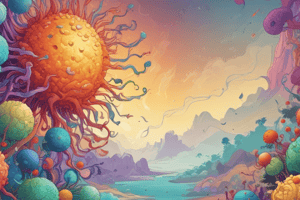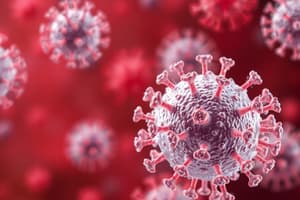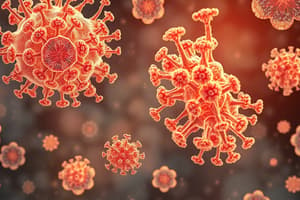Podcast
Questions and Answers
What is the reason behind the difference in immunogenicity among individuals and species?
What is the reason behind the difference in immunogenicity among individuals and species?
- The age of the individual or species
- The route of antigen administration
- The presence or absence of certain genes that code for receptors on B cells and T cells (correct)
- The variation in the dose of antigen administered
What is the optimal route of administration for immunogens?
What is the optimal route of administration for immunogens?
- Subcutaneous (correct)
- Intravenous
- Intragastric
- Intramuscular
What type of molecules are usually poorly immunogenic?
What type of molecules are usually poorly immunogenic?
- Polysaccharides
- Proteins
- Lipids
- Nucleic acids (correct)
What is the term for substances that can enhance the immune response to an immunogen?
What is the term for substances that can enhance the immune response to an immunogen?
What type of antigens can directly stimulate B cells to produce antibodies without T cell help?
What type of antigens can directly stimulate B cells to produce antibodies without T cell help?
Which subset of DN-T cells is characterized by the expression of C-kit and CD44, but not CD25?
Which subset of DN-T cells is characterized by the expression of C-kit and CD44, but not CD25?
What is the consequence of the formation of pre-TCR on the TCR β-chain?
What is the consequence of the formation of pre-TCR on the TCR β-chain?
At which stage do cells destined to become γ T cells diverge from the main T cell developmental pathway?
At which stage do cells destined to become γ T cells diverge from the main T cell developmental pathway?
What is the function of the pre-T cell receptor (pre-TCR)?
What is the function of the pre-T cell receptor (pre-TCR)?
When does the rearrangement of the TCR α chain gene begin?
When does the rearrangement of the TCR α chain gene begin?
Flashcards are hidden until you start studying
Study Notes
Immunogen and Antigen Definitions
- Immunogen: a substance that induces a specific immune response
- Antigen (Ag): a substance/molecule capable of stimulating an immune response and reacting with the products of a specific immune response
- Hapten: a small molecule that is non-immunogenic but can react with the products of a specific immune response when coupled to a carrier molecule
- Epitope or Antigenic Determinant: the portion of an antigen that combines with the products of a specific immune response
- Antibody (Ab): a specific protein produced in response to an immunogen that reacts with an antigen
Factors Influencing Immunogenicity
Contribution of the Immunogen
- Foreignness: the immune system discriminates between self and non-self, making foreign molecules immunogenic
- Size: larger molecules tend to be more immunogenic
- Chemical Composition: complex substances are generally more immunogenic
- Physical Form: particulate antigens are more immunogenic than soluble ones, and denatured antigens more immunogenic than native forms
- Degradability: antigens that are easily phagocytosed are generally more immunogenic
Contribution of the Biological System
- Genetic Factors: some substances are immunogenic in one species but not in another, or in one individual but not in others
- Age: the very young and the very old have a diminished ability to mount an immune response
Method of Administration
- Dose: the dose of administration of an immunogen can influence its immunogenicity
- Route: the subcutaneous route is generally better than intravenous or intragastric routes
- Adjuvants: substances that can enhance the immune response to an immunogen, but can have undesirable side effects
Chemical Nature of Immunogens
- Proteins: the vast majority of immunogens are proteins, which are usually very good immunogens
- Polysaccharides: pure polysaccharides and lipopolysaccharides are good immunogens
- Nucleic Acids: nucleic acids are usually poorly immunogenic, but can become immunogenic when single-stranded or complexed with proteins
- Lipids: lipids are generally non-immunogenic, but can be haptens
Types of Antigens
- T-independent Antigens: antigens that can directly stimulate B cells to produce antibodies without requiring T cell help
T-Cell Maturation, Activation, and Differentiation
- Cellular (cell-mediated) immunity is based on the action of specific kinds of T lymphocytes that directly attack cells infected with viruses or parasites, transplanted cells or organs, and cancer cells.
T-Cell Development in the Thymus
- Progenitor T cells migrate to the thymus from early sites of haematopoiesis.
- T-cell maturation involves re-arrangement of the germ line TCR genes and the expression of various membrane markers.
Developmental Stages of T-Cells
- Precursor T cells arrive at the thymus without expressing T-Cell receptor, CD3 complex, CD4, and CD8.
- Recombination Activation Gene (RAG) 1 and RAG 2 are needed for re-arrangement of TCR genes.
- The differentiating T cell passes through a series of stages marked by characteristic changes in their cell surface phenotype.
- These stages are:
- Double Negative (DN) cells, characterized by the absence of CD4 and CD8.
- DN1 cells, which are C-kit+, CD44+, and CD25-.
- DN2 cells, which are C-kit+, CD44 high, and CD25+.
- DN3 cells, which are C-kit–, CD44–, and CD25+, and halt proliferation with TCR β rearrangement.
- DN4 cells, which are double positive (DP) with CD4 and CD8 co-receptors expressed.
Pre-TCR and TCR Gene Rearrangement
- The newly synthesized β-chain combines with a 33-kDa glycoprotein known as the pre-T cell receptor or pre-TCR.
- Formation of pre-TCR activates a signal transduction pathway, leading to:
- Indication of productive TCR β-chain re-arrangement and signaling further proliferation and maturation.
- Suppression of further re-arrangement of TCR β-chain, resulting in allelic exclusion.
- Rendering the cell permissive for re-arrangement of the TCR α chain.
- Induction of developmental progression to CD4+ and CD8+ double positive (DP) state.
Double Positive (DP) Stage
- During the DP stage, TCR α-chain gene rearrangement still has not occurred.
- Rearrangement of α-chain gene begins when the double positive (DP) thymocytes stop proliferating and RAG-2 protein level increases.
Studying That Suits You
Use AI to generate personalized quizzes and flashcards to suit your learning preferences.




